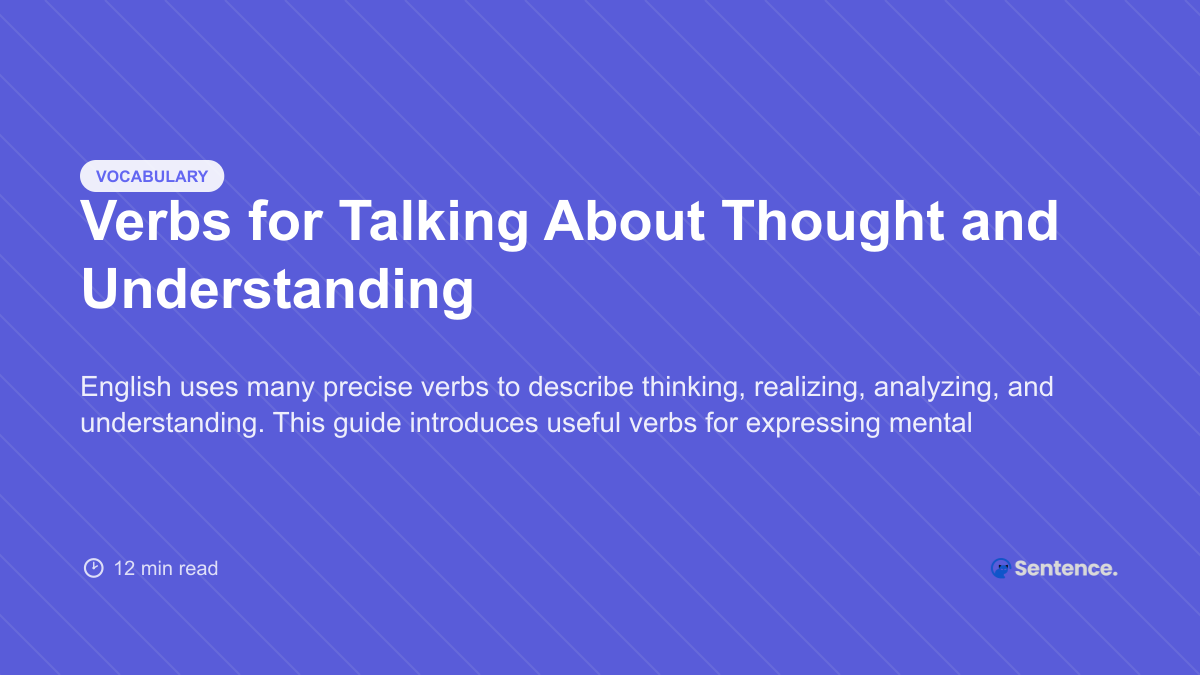
Verbs for Talking About Thought and Understanding
English uses many precise verbs to describe thinking, realizing, analyzing, and understanding. This guide introduces useful verbs for expressing mental processes clearly and naturally.

English uses many precise verbs to describe thinking, realizing, analyzing, and understanding. This guide introduces useful verbs for expressing mental processes clearly and naturally.
When talking about ideas, decisions, or mental processes, English learners often rely on basic verbs like “think,” “know,” or “understand.” But English has many more specific verbs that express different shades of thought. Using these verbs helps you communicate ideas more accurately and professionally.
This article introduces practical verbs for talking about thoughts, conclusions, and understanding. You’ll learn what each verb means, how it’s used in sentences, and how to choose the right one for everyday conversations or academic writing.
These verbs describe the process of thinking carefully about something. They are useful when you want to show that someone is reflecting, analyzing, or evaluating an idea rather than simply having a quick thought.
| Verb | Meaning | Example |
|---|---|---|
| consider | to think about something carefully | I’m considering moving to a new city. |
| reflect | to think deeply about something | She reflected on her past decisions. |
| ponder | to think slowly and seriously | He pondered the meaning of the question. |
| weigh | to think about both sides of something | They weighed the pros and cons before choosing. |
These verbs help you express more thoughtful, intentional thinking, especially when describing decisions or important choices.
These verbs describe moments when someone begins to understand something or becomes aware of new information. They are especially useful in storytelling, academic writing, or personal reflections.
| Verb | Meaning | Example |
|---|---|---|
| realize | to suddenly understand something | I realized I left my keys at home. |
| notice | to become aware through your senses | She noticed he looked tired. |
| grasp | to understand something complex | He finally grasped the concept. |
| figure out | to understand after solving or thinking | They figured out how the machine works. |
These verbs express deeper or more sudden understanding, making your descriptions clearer and more specific than simply saying “I understood.”
These verbs describe how people create ideas, form judgments, or develop beliefs. They are especially useful when expressing viewpoints or explaining how someone arrived at a decision.
| Verb | Meaning | Example |
|---|---|---|
| assume | to accept something as true without proof | Don’t assume he knows the answer. |
| suppose | to imagine something is true | I suppose it might rain later. |
| believe | to think something is true | She believes honesty is important. |
| conclude | to reach a final decision after thinking | The team concluded the plan was effective. |
These verbs show the shift from thinking to forming a final opinion, helping your writing sound more thoughtful and accurate.
These verbs are used when talking about problem-solving, critical thinking, or analyzing information. They are powerful in academic writing, discussions, and professional communication.
| Verb | Meaning | Example |
|---|---|---|
| analyze | to examine something carefully | We analyzed the data for errors. |
| evaluate | to judge the value or quality of something | The teacher evaluated the students' essays. |
| interpret | to explain the meaning of something | He interpreted the results correctly. |
| reason | to think logically to reach a conclusion | She reasoned that the plan would succeed. |
These verbs help you talk about logical or systematic thinking, often used in problem-solving or decision-making situations.
Learning thought-related verbs becomes easier when you connect each one to a real situation. Think of moments when you realized a mistake, weighed different choices, or analyzed a difficult problem. Associating verbs with personal experiences helps you remember them naturally and use them correctly in conversations or writing.
Memory Tip:
Choose the verb that matches the depth of thinking—quick noticing, deep reflection, or final conclusion.
Answers: realized / evaluate / weighed / figured out
⭐ Pro Tip: Using specific mental-process verbs makes your English more expressive, professional, and precise.
Thought-related verbs let you express how people process information, form opinions, and arrive at conclusions. Whether you’re describing a sudden realization, a careful analysis, or a developing belief, using the right verb helps you communicate clearly and naturally. With regular practice, these verbs will become a natural part of your vocabulary.